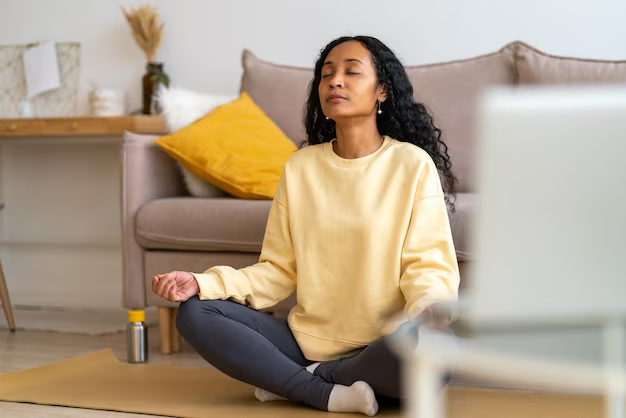Finding Peace: Practical Ways to Cope with Anxiety
Anxiety can be an overwhelmingly common experience. In today’s fast-paced world, it's no surprise that many individuals find themselves battling this relentless companion. However, understanding and managing anxiety doesn't have to be an impossible task. Here's how you can effectively cope with anxiety and reclaim your sense of calm.
Understanding Anxiety: What Is It?
Anxiety is not just the occasional worry or fear we all feel. It's a more intense, persistent experience that can interfere with daily life. Individuals facing anxiety frequently experience:
- Physical Symptoms: Heart palpitations, sweaty palms, and muscle tension.
- Emotional Symptoms: Overwhelming fear, restlessness, and irritability.
- Cognitive Symptoms: Difficulty concentrating and persistent negative thoughts.
Recognizing these symptoms is the first step in understanding your relationship with anxiety.
Stress Management: Building Your Emotional Toolbox
Imagine having a toolbox filled with reliable techniques to help manage anxiety. Here are a few pivotal tools to include:
Mindfulness and Meditation
Mindfulness invites you to be present in the moment. Regular meditation practice can reduce symptoms by grounding you in the present and encouraging a break from anxious thoughts.
Breathing Exercises
Deep breathing is a simple yet effective way to reduce anxiety. Try the 4-7-8 technique — inhale for four counts, hold for seven, and exhale for eight. This method can help regulate your body's stress response.
Physical Activity
Incorporating regular exercise into your lifestyle can significantly lower anxiety levels. Physical activity releases endorphins — natural mood lifters — and provides an outlet for negative emotions.
Cognitive Behavioral Strategies: Changing Your Thought Patterns
Your thoughts have a powerful impact on your anxiety levels. Cognitive Behavioral Therapy (CBT) techniques focus on transforming negative thoughts into positive ones. Here’s how you can incorporate some of these strategies day-to-day:
- Identify Negative Thoughts: Acknowledge specific fears or worries.
- Challenge Those Thoughts: Question their validity. Are they based on facts or assumptions?
- Replace Them: Formulate a more balanced, realistic perspective.
This approach can dramatically decrease anxiety triggers by encouraging healthier thinking patterns.
Lifestyle Adjustments: Setting the Foundation for Mental Well-being
Certain lifestyle changes can contribute to managing anxiety. Here are a few effective modifications:
Nutrition and Hydration
Your diet plays a crucial role in mental health. Nutrient-rich foods like whole grains, vegetables, lean proteins, and omega-3 fatty acids can positively impact mood. Staying hydrated by drinking plenty of water is equally important.
Sleep Hygiene
Quality sleep is a cornerstone of emotional resilience. To improve sleep, create a regular sleep schedule, make your bedroom a calm sanctuary, and limit screen time before bed.
Limit Stimulants and Alcohol
Substances like caffeine and alcohol can exacerbate anxiety symptoms. Moderation is key. Opt for calming beverages such as herbal tea when feeling particularly tense.
Social Support: Strength in Connection
No one should face anxiety alone. Engaging with supportive social networks can provide comfort and relief. Consider:
- Talking to Friends and Family: Sharing your experiences can lighten the emotional load.
- Joining Support Groups: Being part of a group of individuals with similar experiences can provide understanding and solidarity.
Professional Help: Enlisting the Experts
Sometimes, professional guidance can provide a clearer path toward managing anxiety. Therapists and counselors can offer tailored strategies and support along your journey. While this article provides general guidance, a mental health professional can address personalized needs.
When to Seek Help
Look for signs like persistent avoidance of activities, overwhelming feelings, or when anxiety significantly impacts daily functioning. These may indicate it’s time to reach out for professional assistance.
Empowerment: Recognizing Your Progress
Overcoming anxiety is a journey. Celebrate small victories, such as trying a new breathing technique or engaging in a social event. Self-compassion is crucial. Remember, progress, not perfection, is the goal.
The Importance of Routine: Cultivating Consistency
Establishing daily routines can offer predictability — a comforting ally against anxiety. Consider integrating:
- Morning Routines: Start your day with mindfulness or light stretching.
- Evening Wind-Down Rituals: Engage in calming activities like reading a book or journaling before sleeping.
- Scheduled Breaks and Activities: Breaking the day into manageable parts can create a sense of control.
Digital Detox: Balancing Screen Time
While technology keeps us connected, it can also contribute to anxiety. Consider these strategies for a healthier tech relationship:
- Set Screen Time Limits: Allocate specific times for device use and stick to them.
- Digital Breaks: Take regular breaks away from screens to rest your eyes and mind.
Gratitude Practice: Enhancing Positivity
Shifting focus from stress to gratitude can create emotional balance. Keep a gratitude journal to note daily positives, no matter how small. This practice fosters positivity and resilience against anxiety.
Acknowledging and Accepting Fear
Recognizing that fear is a natural human emotion, not an enemy, can be transformative. Acknowledge your fears and give them space rather than resisting them. Acceptance often lessens their intensity.
To navigate anxiety effectively, build a personalized toolkit. Adopt and adapt strategies that best fit your lifestyle and emotional needs. Remember, altering how you relate to anxiety is a powerful step toward peace and fulfillment.
🌟 Quick Summary: Coping with Anxiety
- Mindfulness & Breathing: Practice meditation and deep breathing. 🧘♂️
- Exercise: Engage in regular physical activity. 🏃♀️
- Healthy Habits: Focus on nutrition, sleep hygiene, and limit stimulants. 🌿
- Cognitive Strategies: Identify and reframe negative thoughts. 💭
- Social Support: Lean on friends, family, or support groups. 👥
- Professional Help: Seek guidance when needed. 🩺
- Routine & Tech Balance: Establish a routine and manage screen time. 📱
- Gratitude & Acceptance: Practice gratitude and accept your emotions. 🙏
Remember, managing anxiety is a journey, not a destination. Embrace the process, and know that every small step counts.

